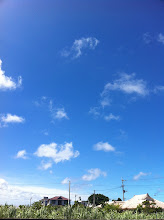2013年3月11日月曜
18,000人超の死者・行方不明者を出した東日本大震災から、2年が経ちました。
先ほど、日本時間の午後2時46分に合わせ、1分間の黙祷を捧げました。
地震発生の瞬間のことは、今でも体が覚えています。
社内のクリーンデーで不要書類の片付けをしていた時でした。積み上げた段ボール箱の前で同僚にしがみつき、まっすぐ立つこともしゃがむことも出来ずに、眼前のガラスの壁がこんにゃくのようにしなるのを凝視していました。
その後、2回の屋外避難を経ていわゆる"帰宅困難者"の仲間入りはしましたが、楽に自宅までたどり着いた方だと思いますし、自宅の被害も軽微でしたし、家族や友人・知人の無事も確認できました。
しかしその後、テレビから溢れてきた映像には絶句するしかありませんでした。
あの津波の映像を観ていた世界中の誰もが同様であったと思います。
ついさっきまで「普通」で「当たり前」であったことが目の前で壊されていく衝撃が、そしてそのとてつもない破壊力が今にも自分に届きそうな恐怖が、私のように想像力の乏しい人間にも分かりやすい形で、現実という最悪の形で、テレビの向こうで広がっていました。
その後の混乱と自衛隊や各国から派遣された救助隊の方々の活動は私がわざわざ繰り返すまでもありませんが、この震災で、未来に対する自分の考え方が少し変わりました。
このプロジェクト31の基本姿勢である Carpe Diem も、その時に強化された意識のひとつです。
明日もまた同じ景色を見られる保証など、どこにもないのです。
自分に何も起こらなくても、自分以外の大切な何かに大きな転換があるかもしれない。
いつでも言えるはずだった「元気?」を言う術を、明日突然、永遠に失うかもしれない。
「あなたが無為に過ごした今日は、昨日死んでいった誰かがあれほどまでに生きたがった明日」という韓国の言葉があるそうですが、無為でも無茶でも無駄でも無意味でもいいから、今日という日を後悔しないように生きたいと強く思います。
そんな思いを抱えて、一年前の今日、このブログを始めました。
一年前の私に恥ずかしくない生き方をしているか、
二年前の私が受けた衝撃を忘れずにいられているか、
そして一年後の私が納得できるような日々を過ごしているか。
たまには少しだけ真面目に反省しつつ、Labour Day(勤労感謝の日)*の夜を過ごしています。
あらためて、東日本大震災で命を落とされた方々のご冥福をお祈りするとともに、被災され、今もって不自由な生活を強いられている方々に心よりお見舞い申し上げます。
* オーストラリアの Labour Day(勤労感謝の日)は、州によって日付がまったく異なります。ここビクトリア州とタスマニアは今日でしたので、この週末は三連休でした。
 |
| 祈ろう、 日本のために |
2013. 3. 11 Mon.
--- Pray for Japan.
Two years ago, on March 11th, the biggest earthquake ever recorded in Japan has hit the northeastern region. The enormous waves of tsunami triggered by the quake have literally washed away the coastal towns, claiming over 18,000 lives.
I myself was at work, and it was supposed to be just another Friday with some weekend plans to look forward to. When the earthquake hit at 2:46 p.m., a coworker nearby and I held each other so tightly for a support, as it was impossible to stay standing straight. We were standing next to a big glass wall which was bending back and forth like a flower in the wind, and I kept staring at the glass wall so we can dash away in case the glass should break.
It felt like forever.
That night, despite all the public transportations broken down and the government's call to stay in office if possible, I took a chance and tried to walk home. I stepped out of the building and saw hundreds of people in suits, with some wearing helmets and aluminum blankets, trying to get home just like me. (Sankei news reported that the estimate number of such people was 5.15 million in Tokyo and surrounding area.)
It was almost surreal. So many people crowded the streets leading to Shibuya station, one of the major hub stations in Tokyo, yet there were no yelling or crying or pushing. People kept calm and no one seemed panicked or hysterical. Some stores and restaurants, even office buildings, had opened up their space and toilets for people to use. Almost all the ready-to-eat foodstuff in convenience stores were gone, but there were no fightings over scarce resources. People lined up in a queue, just like they would at any given time.
That night was only the beginning, and I had no idea what was going on in the northeastern Prefectures. The video footages showed houses, cars, tankers, schools, hospitals, city halls, and everything being washed away like a wave erases a word written in the sand. Many people survived, many didn't. A boy saw his father driving towards the school to pick him up after the quake; and he saw the car being swept away by the tsunami. A young woman at the town office kept urging people over loudspeakers to run to higher ground until the very last minute, and lost her life in tsunami.
Similar stories were found everywhere.
It was a tough time.
I jumped up in my chair every time the earthquake alarm went off on every mobile phone around me; and it made my heart to sink to imagine how people in the affected regions must have reacted to the dreadful alarm. The explosion at Fukushima Daiichi Nuclear Power Plant was a rock salt rubbed into the bleeding wound. That really didn't have to happen.
Amid all the devastation and desperation, however, we kept receiving strong and heartfelt words of condolences and prayers from all around the world. "My heart goes out to you," they said, and that they trust Japan would overcome this unprecedented catastrophe. The official offers for assistance we received from 128 countries and 33 international organizations is already enough to thank for, but private messages and aids from individuals across the globe have never ceased to touch my heart to this day. I have seen messages on YouTube and Facebook, coworkers from overseas offices sent us warm messages, and I even received a personal offer to help accommodate a student from affected area.
People prayed for Japan.
And I have been overwhelmed with gratitude.
As I mentioned in my very first article of this blog (Introduction), this catastrophe has made me reaffirm my Carpe Diem attitude. Nothing remains the same, and every day is a chance given. Nothing is guaranteed for tomorrow, and I may never get to see what I see now and take for granted. I may regret sparing a simple "how are you?" to the ones I care.
So, I shall seize the day, for today is the day that someone who died yesterday wished so badly to live.
I shall be grateful, be responsible, be compassionate, be open-minded, be attentive, be friends, and be myself, at my own risk.
Carpe Diem!







0 コメント:
コメントを投稿